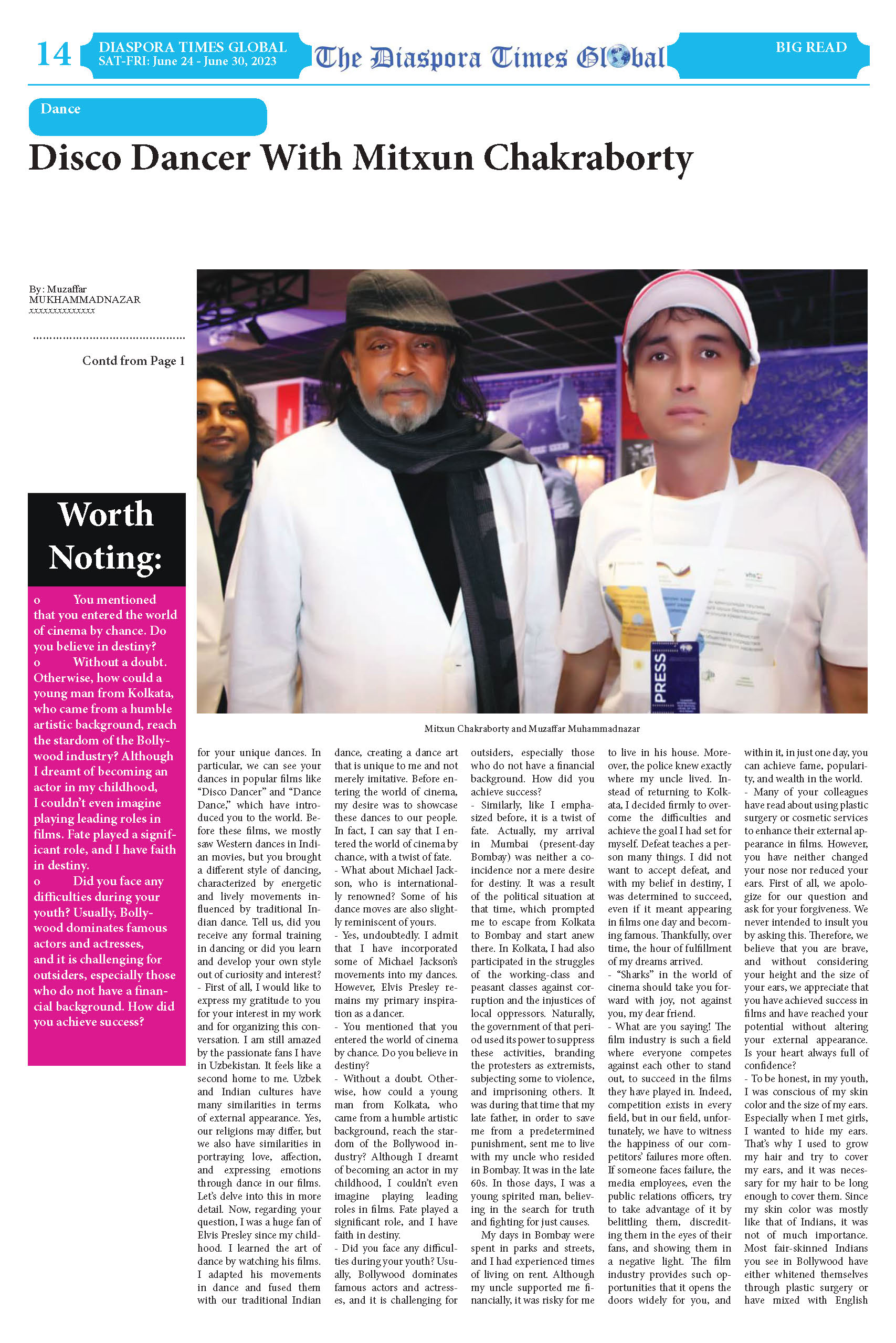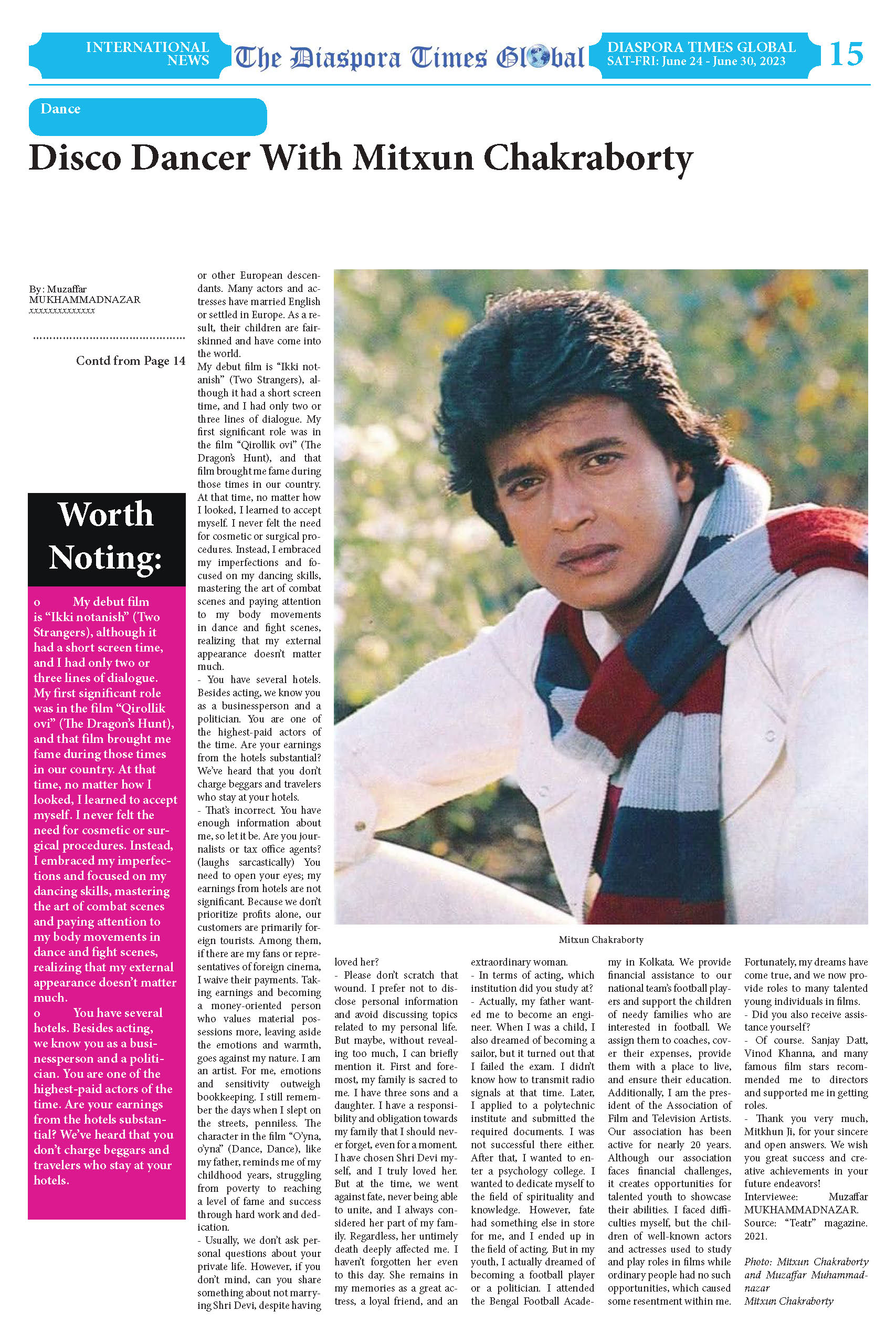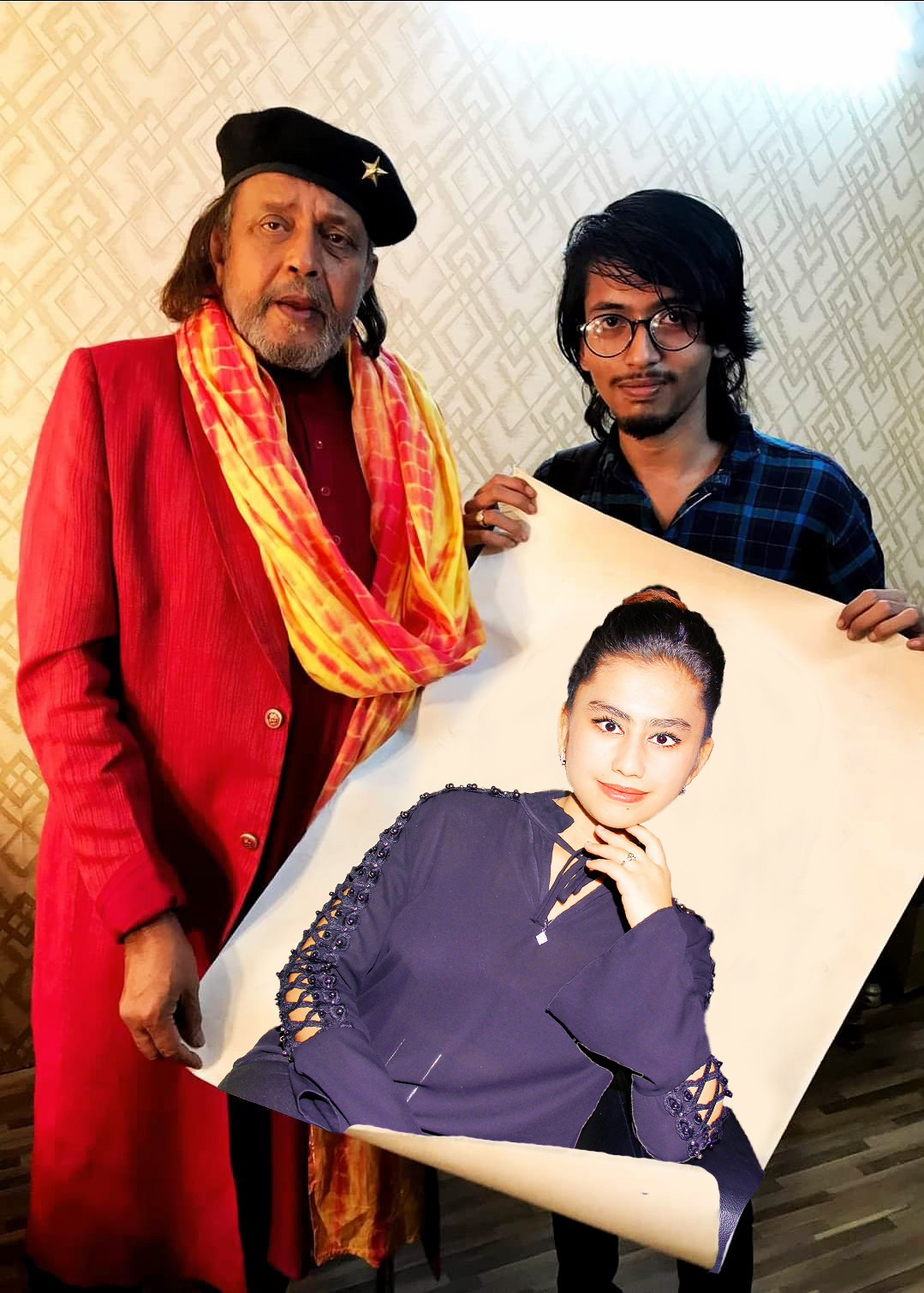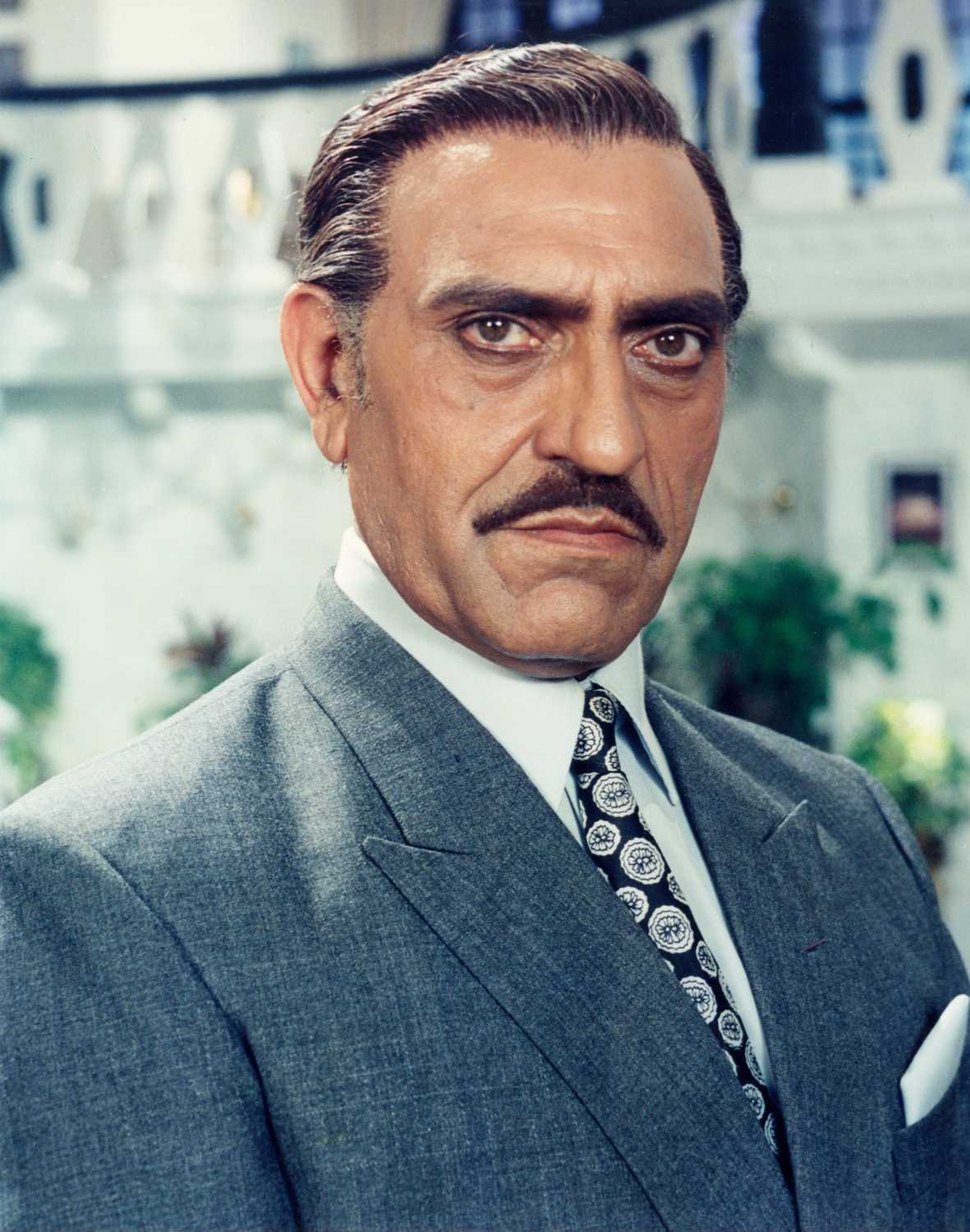DISCO DANCER WITH MITHUN CHAKRABORTY

DISCO DANCER WITH MITHUN CHAKRABORTY
Bollywood star - Mitkhun Chakraborty (real name - Gouranga Chakraborty; born on June 16, 1950, in Kolkata, India). A famous Indian actor who has appeared in more than 350 films.
Our conversation with Mitkhun took place in the room he stayed at the "Hilton" hotel in our capital. Due to the restriction on taking photos and recording videos according to the hotel's policy, the conversation was recorded and transcribed by a dicta phone, and our interview was conducted in English. We express our gratitude to the director of the National Center for the Development of the Uzbek Film Industry, Barno Ungboeva, for creating the conditions and opportunities to interview the Bollywood star, and we thank the editor of "Theater" magazine, Shakhribon Imomov, for publishing this interview in "Theater" journal.
- Assalamu alaykum, Mr. Mitkhun, we are delighted to have you here in Uzbekistan. Apart from your acting career, you are also famous for your unique dances. In particular, we can see your dances in popular films like "Disco Dancer" and "Dance Dance," which have introduced you to the world. Before these films, we mostly saw Western dances in Indian movies, but you brought a different style of dancing, characterized by energetic and lively movements influenced by traditional Indian dance. Tell us, did you receive any formal training in dancing or did you learn and develop your own style out of curiosity and interest?
- First of all, I would like to express my gratitude to you for your interest in my work and for organizing this conversation. I am still amazed by the passionate fans I have in Uzbekistan. It feels like a second home to me. Uzbek and Indian cultures have many similarities in terms of external appearance. Yes, our religions may differ, but we also have similarities in portraying love, affection, and expressing emotions through dance in our films. Let's delve into this in more detail. Now, regarding your question, I was a huge fan of Elvis Presley since my childhood. I learned the art of dance by watching his films. I adapted his movements in dance and fused them with our traditional Indian dance, creating a dance art that is unique to me and not merely imitative. Before entering the world of cinema, my desire was to showcase these dances to our people. In fact, I can say that I entered the world of cinema by chance, with a twist of fate.
- What about Michael Jackson, who is internationally renowned? Some of his dance moves are also slightly reminiscent of yours.
- Yes, undoubtedly. I admit that I have incorporated some of Michael Jackson's movements into my dances. However, Elvis Presley remains my primary inspiration as a dancer.
- You mentioned that you entered the world of cinema by chance. Do you believe in destiny?
- Without a doubt. Otherwise, how could a young man from Kolkata, who came from a humble artistic background, reach the stardom of the Bollywood industry? Although I dreamt of becoming an actor in my childhood, I couldn't even imagine playing leading roles in films. Fate played a significant role, and I have faith in destiny.
- Did you face any difficulties during your youth? Usually, Bollywood dominates famous actors and actresses, and it is challenging for outsiders, especially those who do not have a financial background. How did you achieve success?
- Similarly, like I emphasized before, it is a twist of fate. Actually, my arrival in Mumbai (present-day Bombay) was neither a coincidence nor a mere desire for destiny. It was a result of the political situation at that time, which prompted me to escape from Kolkata to Bombay and start anew there. In Kolkata, I had also participated in the struggles of the working-class and peasant classes against corruption and the injustices of local oppressors. Naturally, the government of that period used its power to suppress these activities, branding the protesters as extremists, subjecting some to violence, and imprisoning others. It was during that time that my late father, in order to save me from a predetermined punishment, sent me to live with my uncle who resided in Bombay. It was in the late 60s. In those days, I was a young spirited man, believing in the search for truth and fighting for just causes.
My days in Bombay were spent in parks and streets, and I had experienced times of living on rent. Although my uncle supported me financially, it was risky for me to live in his house. Moreover, the police knew exactly where my uncle lived. Instead of returning to Kolkata, I decided firmly to overcome the difficulties and achieve the goal I had set for myself. Defeat teaches a person many things. I did not want to accept defeat, and with my belief in destiny, I was determined to succeed, even if it meant appearing in films one day and becoming famous. Thankfully, over time, the hour of fulfillment of my dreams arrived.
- "Sharks" in the world of cinema should take you forward with joy, not against you, my dear friend.
- What are you saying! The film industry is such a field where everyone competes against each other to stand out, to succeed in the films they have played in. Indeed, competition exists in every field, but in our field, unfortunately, we have to witness the happiness of our competitors' failures more often. If someone faces failure, the media employees, even the public relations officers, try to take advantage of it by belittling them, discrediting them in the eyes of their fans, and showing them in a negative light. The film industry provides such opportunities that it opens the doors widely for you, and within it, in just one day, you can achieve fame, popularity, and wealth in the world.
- Many of your colleagues have read about using plastic surgery or cosmetic services to enhance their external appearance in films. However, you have neither changed your nose nor reduced your ears. First of all, we apologize for our question and ask for your forgiveness. We never intended to insult you by asking this. Therefore, we believe that you are brave, and without considering your height and the size of your ears, we appreciate that you have achieved success in films and have reached your potential without altering your external appearance. Is your heart always full of confidence?
- To be honest, in my youth, I was conscious of my skin color and the size of my ears. Especially when I met girls, I wanted to hide my ears. That's why I used to grow my hair and try to cover my ears, and it was necessary for my hair to be long enough to cover them. Since my skin color was mostly like that of Indians, it was not of much importance. Most fair-skinned Indians you see in Bollywood have either whitened themselves through plastic surgery or have mixed with English or other European descendants. Many actors and actresses have married English or settled in Europe. As a result, their children are fair-skinned and have come into the world.
My debut film is "Ikki notanish" (Two Strangers), although it had a short screen time, and I had only two or three lines of dialogue. My first significant role was in the film "Qirollik ovi" (The Dragon's Hunt), and that film brought me fame during those times in our country. At that time, no matter how I looked, I learned to accept myself. I never felt the need for cosmetic or surgical procedures. Instead, I embraced my imperfections and focused on my dancing skills, mastering the art of combat scenes and paying attention to my body movements in dance and fight scenes, realizing that my external appearance doesn't matter much.
- You have several hotels. Besides acting, we know you as a businessperson and a politician. You are one of the highest-paid actors of the time. Are your earnings from the hotels substantial? We've heard that you don't charge beggars and travelers who stay at your hotels.
- That's incorrect. You have enough information about me, so let it be. Are you journalists or tax office agents? (laughs sarcastically) You need to open your eyes; my earnings from hotels are not significant. Because we don't prioritize profits alone, our customers are primarily foreign tourists. Among them, if there are my fans or representatives of foreign cinema, I waive their payments. Taking earnings and becoming a money-oriented person who values material possessions more, leaving aside the emotions and warmth, goes against my nature. I am an artist. For me, emotions and sensitivity outweigh bookkeeping. I still remember the days when I slept on the streets, penniless. The character in the film "O'yna, o'yna" (Dance, Dance), like my father, reminds me of my childhood years, struggling from poverty to reaching a level of fame and success through hard work and dedication.
- Usually, we don't ask personal questions about your private life. However, if you don't mind, can you share something about not marrying Shri Devi, despite having loved her?
- Please don't scratch that wound. I prefer not to disclose personal information and avoid discussing topics related to my personal life. But maybe, without revealing too much, I can briefly mention it. First and foremost, my family is sacred to me. I have three sons and a daughter. I have a responsibility and obligation towards my family that I should never forget, even for a moment. I have chosen Shri Devi myself, and I truly loved her. But at the time, we went against fate, never being able to unite, and I always considered her part of my family. Regardless, her untimely death deeply affected me. I haven't forgotten her even to this day. She remains in my memories as a great actress, a loyal friend, and an extraordinary woman.
- In terms of acting, which institution did you study at?
- Actually, my father wanted me to become an engineer. When I was a child, I also dreamed of becoming a sailor, but it turned out that I failed the exam. I didn't know how to transmit radio signals at that time. Later, I applied to a polytechnic institute and submitted the required documents. I was not successful there either. After that, I wanted to enter a psychology college. I wanted to dedicate myself to the field of spirituality and knowledge. However, fate had something else in store for me, and I ended up in the field of acting. But in my youth, I actually dreamed of becoming a football player or a politician. I attended the Bengal Football Academy in Kolkata. We provide financial assistance to our national team's football players and support the children of needy families who are interested in football. We assign them to coaches, cover their expenses, provide them with a place to live, and ensure their education. Additionally, I am the president of the Association of Film and Television Artists. Our association has been active for nearly 20 years. Although our association faces financial challenges, it creates opportunities for talented youth to showcase their abilities. I faced difficulties myself, but the children of well-known actors and actresses used to study and play roles in films while ordinary people had no such opportunities, which caused some resentment within me. Fortunately, my dreams have come true, and we now provide roles to many talented young individuals in films.
- Did you also receive assistance yourself?
- Of course. Sanjay Datt, Vinod Khanna, and many famous film stars recommended me to directors and supported me in getting roles.
- Thank you very much, Mitkhun Ji, for your sincere and open answers. We wish you great success and creative achievements in your future endeavors!
Interviewee: Muzaffar MUKHAMMADNAZAR.
Source: "Teatr" magazine. 2021.



-
Бўлимлар
Маълумот
Янгиликлар new
Изоҳлар
Карима Зарипова
{Здравствуйте я бы хотела поступить в вашь Эстрадно цирковой колледж
БАЧАДОН ТУШИШИ ХАВФЛИМИ?..
qin devori tuwganda uy sharoitida aperatsiya lazerlarsiz davolasa buladimi qin devorini uy sharoitida aperatsiya lazerlarsz davolasa bulladimi
Нега сўгал тошади?
Ассалому алекум кулимга сунгал чикди хеч чикмас эди канде йукотса булади
“ШАРҚ ЮЛДУЗИ” БОРМИ?
Ёшлигимда мен ҳам бу журнални севиб ўқиганман, отам йиққан бўсалар керакда уйимизда эски сонлари ҳам турарди. Ҳикоянгиз мени ҳам болалигимга об

Соғинч соҳиллари - Ўзбекистон халқ артисти - Мирза Азизов хотирасига.
Устоз санъаткор Мирза Азизовнинг бетакрор роллари, ҳар қандай қаҳрамонни психологик қиёфасини моҳирона ижро этиши у кишини халқимиз қалбидан ўрин
Маълумот








